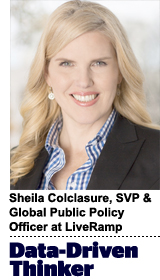
“Data-Driven Thinking” is written by members of the media community and contains fresh ideas on the digital revolution in media.
Today’s column is written by Sheila Colclasure, senior vice president and global public policy officer at LiveRamp.
If you want your company to exist now and in the future, you will have to think and act with data. Think of it like looking through a microscope: Data has always been there, but now we can see it more clearly, and an entire dynamic data ecosystem exists that offers new and exciting opportunities.
With this comes accountability – data can power an enterprise successfully or damage the brand and cause harm. Unethical parties can violate privacy norms, causing embarrassment and even social or financial damage to individuals. The stakes are high, especially when you consider that the global data market is expected to almost double from more than $15 billion in 2018 to $26 billion in 2019.
Business leaders must think strategically about the reality of becoming data-driven in a responsible way to deliver benefits and prevent harm. They must ensure ethical data use. An accountability-based data ethics program can build trust with customers, minimize risk and future-proof the business.
Buy-in from the top
Leadership must commit to operationalizing data ethics at all levels of the organization to lower the risk profile of data activations, data use and data-driven solutions. Getting widespread and unanimous leadership commitment to be accountable or responsible for all data collection and use is the first step; if those in charge believe it and are committed to it, everything else will follow.
Ethics code
Ethical data use processes must govern all product development, as well as any machine learning and AI systems that act on the data.
Taking this one step further, it’s also helpful to deploy an interrogation process in the design layer, evaluating each use of data and the potential outcomes. Remember, computer code is conduct. Accountability must be methodically embedded within the engineering layer of all product development and data flow functions.
In other words, as part of any ethical data program, companies should be able to answer the question: How does this data relate to and benefit the individual?
Internal audits
Independent oversight starts with a thorough audit of all data and data uses. Organizations of all sizes must thoroughly interrogate the impact and consequence of data use for all stakeholders to balance maximum data enablement and risk management, always looking for opportunities to provide additional transparency and control.
They must not only stand ready to demonstrate a commitment to internal policies and document the mechanisms that put those policies into effect, but also be willing and able to remediate when necessary.
Ethical sourcing and partner accountability
Data buyers and users have to understand the provenance of all data they source and mitigate any risks with downstream use of their data. Depending on what the service or solution mix is, a company may be responsible for clients’ use of onboarding events or use of data from a data marketplace. Companies must thoroughly review the privacy policies of potential vendors or partners and ask to review documentation of their data governance methodology to ensure appropriate permissions are secured.
How are they enforcing stated policies within their enterprise? If they are unable to provide this quickly and easily, move on.
Globally we have General Data Protection Regulation, and in the United States we have the upcoming California Consumer Privacy Act, with many more pieces of potential legislation currently under evaluation at the state and federal levels. Companies have to think about ethical data use.
If you’re in any leadership role, or even if you’re not, ask yourself: Are you transparent? Can consumers understand how you are collecting, using and sharing their data?
New laws are coming online soon. Companies can future-proof their enterprise by transforming their data governance program into both a consultative resource for the enterprise and a mandated oversight and internal monitoring function.
One of the best ways to put control back in the hands of the consumer is by creating a data ethics program. It’s never too soon or too late to start.
Follow LiveRamp (@LiveRamp) and AdExchanger (@adexchanger) on Twitter.
This post was syndicated from Ad Exchanger.


More Stories
StopPress exclusive Q&A – oOh! Creativity for Impact
Here’s My Beef With Ad Agencies
Retreat To MMM